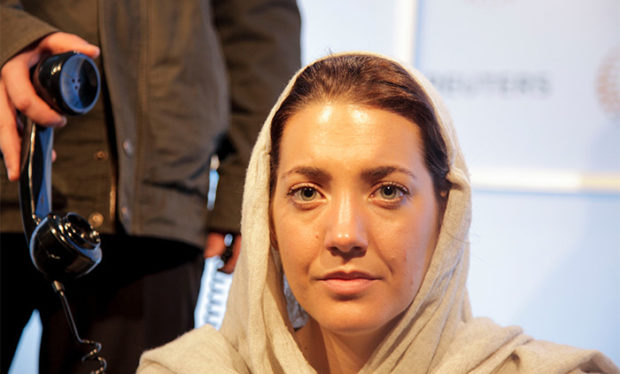You have no items in your cart. Want to get some nice things?
Go shopping
There is the nightmare we can all relate to. It’s that pinch of anxiety we feel when a loved one boards a flight because, although the odds of a plane crash today are around one in eleven million, we can’t help thinking, if only for a moment, that it could be our turn. Did Richard (Neizan Birchwood) feel that pinch when he went to bed in London that evening? The play begins when he’s already in bed, imagining that his wife Nazanin and their baby daughter Gabriella should be landing soon. His phone rings, loud enough for the entire audience to hear. It’s Nazanin’s brother. There was a “glitch”. Nazanin and Gabriella missed their plane to London. They are still in Tehran Airport. And thus begins the Ratcliffe family’s particular nightmare.
Emi Howell is twenty-four years old and this is her first play. Until Looking for Mummy: Nazanin’s Story, she had been adapting classics such as Peter Pan and Alice in Wonderland into plays for children’s theatre classes. A year ago, like most of us, she had not heard of Nazanin Zaghari-Ratcliffe. It was Howell’s mother who first told her daughter about the drama of an Iranian-British mother thrown in an Iranian jail in April 2016 on trumped-up charges. In the past few weeks, Nazanin’s story has taken the media and the public imagination by storm. It may yet bring down the Foreign Secretary. It has raised legal and moral questions about the British government’s duty of care towards UK citizens who hold a second passport. Looking for Mummy: Nazanin’s Story premiered at the Edinburgh Festival in August and was performed on the 15th of November at the Trust Conference at London’s Queen Elizabeth II Conference Centre.
After the brother’s phone call, we see Nazanin (Jessica Butcher) being interrogated by an Iranian guard (Patrick Carmody). The questioning is repetitive and increasingly brutal. Jessica Butcher is a dignified, elegant Nazanin. Even when weakened and in pain, her voice soars when she speaks in an imagined future to her daughter Gabriella, “my Gizu”. Here the words are drawn from Nazanin’s letters and her quotes: “My sweet girl, the sound of your laughter, has been ringing in my ears these past months, becoming one with me.”
Writing a play about a developing news story with no end in sight is risky. Yet Looking for Mummy: Nazanin’s Story should stand the test of time, regardless of the conclusion of this family’s ordeal. Howell, who holds a masters’ degree in Shakespearean studies, stays close to the heart. A mother torn from her home and held prisoner, a daughter without her parents, a father forced to become a hero in order to save his family. You couldn’t make it up.
Howell indeed uses a lot of original source material, and not just from Nazanin and Richard, to write the script. The bland, non-committal communiqués from the Foreign Office sound sinister in the pitch-perfect corporate cheerfulness Howell deploys as government spokesperson. She contrasts the government’s refusal to take a stand with a news report (filmed as a spoof BBC News programme) showing how the UN condemns Nazanin’s arrest and treatment. Neizan Birchwood’s Richard is so real, you recognize him. The guy next door, a nice husband called to an extraordinary fate. You watch him fight, and doubt, and try again until he is taking on the UK government in the full glare of the media. And when Richard confronts the government official who is “requesting” on behalf of the “British government” that he stop his campaigning for this “dual national”, he explodes. “She is British!” he shouts. “Nazanin is as British as you and me.”
This is political theatre at its best. It’s one thing to believe in Nazanin’s innocence and right to justice. It’s another to feel for this young family. We are rooting for them. At first I thought it was because Butcher’s Nazanin is accent-free. Of course she’s British. And these things don’t happen to British (or French, or American) citizens. Howell has gone beyond these first world entitlements. We want Nazanin to come home with Gabriella because we like Richard and Nazanin: we admire their moral courage, their love, their determination to overcome adversity. At some point the Foreign Office offers to repatriate Gabriella from Iran, to reunite her with Richard. He hasn’t seen his daughter in over a year. Nazanin’s health is failing in prison. His eyes on the audience, Richard reasons out loud that Gabriella’s visits to Nazanin in jail are her “only relief”. He declines. He walks away alone. The play ends with Nazanin in prison, wishing Gabriella a happy third birthday and promising her that one day, they would “return to the city we love”. May her wish come true.
For more information on Nazanin’s case, visit Free Nazanin. For more information on the play, including future performances, please visit Howell Productions’ website and subscribe to their newsletter. Click here to sign Richard Ratcliffe’s Change.org petition calling on the UK government to act.
About Isabelle Dupuy
Isabelle Dupuy is a writer based in London. She is currently working on a novel "Living the Dream"





Great review, it really makes you want to go and see the play. The description of the characters etc is very much alive.
Thank you for this journey into Nazanin’s world! Captivating and left me wanting more.